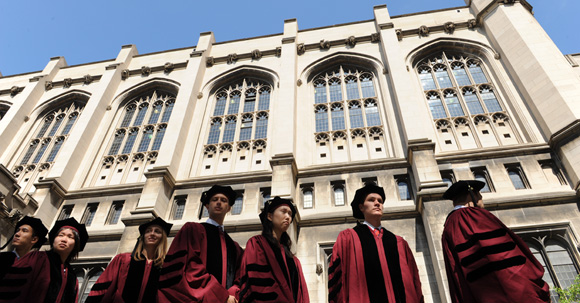| Sun | Mon | Tue | Wed | Thu | Fri | Sat |
|---|---|---|---|---|---|---|
| 1 | 2 | 3 | 4 | 5 | ||
| 6 | 7 | 8 | 9 | 10 | 11 | 12 |
| 13 | 14 | 15 | 16 | 17 | 18 | 19 |
| 20 | 21 | 22 | 23 | 24 | 25 | 26 |
| 27 | 28 | 29 | 30 | 31 |
CATEGORIES
RECENT ENTRIES
BLOG ROLL
The doctorate is in
It’s the economy, stupid. In 2010 Chicago received a record number of applications to PhD programs.

When the economy gets tough, do the tough go to graduate school? Judging from the recent avalanche of applications to Chicago PhD programs in the humanities and social sciences, the answer is yes.
The Division of the Humanities received a record 2,160 applications to its doctoral programs this spring. “It’s the most we’ve ever gotten and about 10 percent higher than last year,” says Sarah Tuohey, assistant dean of students. Competition for available spots was stiff: only 142 candidates—less than 7 percent—were offered admission. Roughly half of all applicants sought spots in just three departments: English, Philosophy, and Art History.
An all-time high of 2,475 people applied to PhD programs in the Social Sciences Division in 2010. Economics, history, and political science were—and perennially are—the most popular fields. Interest in graduate school often jumps when the job market slumps, says Kelly Pollock, assistant dean of students. “In an economy like this, people want to understand what’s going on. You start to hear more about economists and that certainly helps application numbers.”
A year ago, responding to budgetary pressures, the Humanities Division opted to shrink the size of its PhD classes but continue offering five years of fellowship support to every incoming student. In the English Department, just seven students matriculated in the doctoral program in 2009; 543 had applied. This coming fall, classes will be more robust, with 13 projected to matriculate in English (out of 593 applicants), seven in philosophy (out of 250 applicants), and seven in art history (out of 245 applicants).
When, and if, the new arrivals finally earn their PhDs, they are not guaranteed jobs in academia. Nationwide, the percentage of tenure-track teaching positions is declining in all fields, especially in the humanities. Graduate school may lose its appeal as a result.
In at least one area of the University—the Divinity School—prospective PhDs may have already started adjusting their behavior to a new reality. Applications to doctoral and master of divinity programs were down in 2010, which has “a lot to do with perceptions of the job market and available jobs,” says Teresa Hord Owens, dean of students. “It may be a blip.” But it may also be the beginning of a bigger trend.
Elizabeth Station
May 21, 2010
